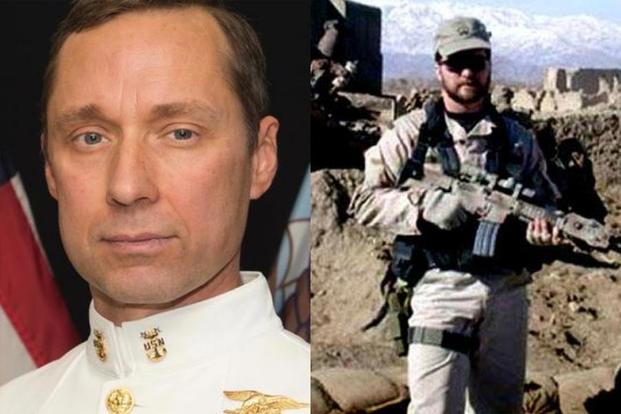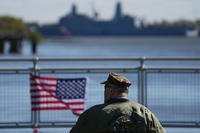A split-second decision by U.S. Navy SEAL Britt K. Slabinski that may have left a man to die by himself on a mountainside shouldn't outweigh the heroic efforts Slabinski and his team made to rescue Petty Officer 1st Class Neil Roberts during an al-Qaida ambush in eastern Afghanistan in 2002, an expert on military valor awards said.
Slabinski led a team back to rescue Roberts after the SEAL was ejected from an MH-47 Chinook that was under direct enemy attack.
Slabinski eventually made the decision to pull his SEAL team out of the battle, but evidence shows Air Force Tech Sgt. John Chapman, the combat controller attached to SEAL Team 6 during Operation Anaconda, a large-scale attempt to clear the Shah-i-Kot Valley of al-Qaida and Taliban forces, was left behind alive.
It has been reported Chapman, who was believed to be dead, lived for more than an hour after the SEAL team left. MQ-1 Predator drone footage reviewed by Defense Department officials showed Chapman continuing to fight, killing more of the enemy and engaging one al-Qaida fighter in hand-to-hand combat.
Chapman's final hours in Afghanistan were unveiled in new details first obtained by The New York Times.
Chapman received the Air Force Cross for his actions, one of the 10 Air Force Crosses and 44 Silver Stars awarded to airmen in the Global War on Terrorism. The Office of the Secretary of Defense reportedly has recommended his award be upgraded to the Medal of Honor, but there has been no word from the White House.
Chapman would be the first airman to receive the award since the Vietnam War.
The White House this week announced that Slabinski, now a retired master chief, will receive the Medal of Honor in a ceremony later this month.
Related content:
- Report: Fallen Air Force Tech Sgt. Approved for Medal of Honor
- Navy SEAL to Receive Medal of Honor for Heroism in Afghanistan
- Meet the Airmen Who Will Get Upgraded Valor Medals
"Then-Senior Chief Slabinski boldly rallied his remaining team and organized supporting assets for a daring assault back to the mountain peak in an attempt to rescue their stranded teammate," the White House said Monday.
"Later, after a second enemy-opposed insertion, [Slabinski] led his six-man joint team up a snow-covered hill, in a frontal assault against two bunkers under withering enemy fire from three directions" and "repeatedly exposed himself to enemy fire" as he took on al-Qaida forces, the White House said.
But according to a recent detailed report from Newsweek, some service members close to the mission, including an Air Force drone operator who had watched a live feed of the battle, said they were shocked to learn Slabinski had even been considered for an elevation in award.
"You kicked me in the nuts when you told me that," an unidentified Army special operator told Newsweek upon hearing the news.
'Heroes Can Make Mistakes Too'
But one noted military historian has a message for those who decry Slabinski's heroism: Butt out.
"Heroes can make mistakes too, so I think this is a moot point," said military historian Doug Sterner, who has curated thousands of award citations for Military Times' Hall of Valor database and written books on America's heroes. "What Britt Slabinski did on that ridge was certainly worthy of the Navy Cross and probably worthy of the Medal of Honor, and whatever happened, happened.”
Referring to the Newsweek story, Sterner said he believed members of other services should "stay out of it" when it comes to troops being honored for valor.
"It's not up to a man in the Army to decide what man in the Navy is going to get a Medal of Honor or up to the Navy to decide what man in the Air Force is going to get a Medal of Honor,” he said.
Conflicted Cases
Sterner explained there will always be discrepancies in perspectives in the fog of war.
He cited the Dakota Meyer-Will Swenson ordeal in which the two men, who both eventually received the highest military award for valor, had conflicting accounts of the same seven-hour battle in the Ganjgal valley near the Pakistan border in 2009.
Meyer, a veteran Marine sergeant, received the Medal of Honor in September 2011. Swenson, now an Army major, received the medal in October 2013.
Investigative reports by McClatchy reporter Jonathan Landay presented evidence that Marine Corps accounts of Meyer's heroism as he drove into an ambush to save U.S. and Afghan troops were overblown and would be undercut by Swenson and the Army's account of events. Swenson is also credited with driving an armorless vehicle into the "kill zone" during the battle to retrieve wounded and pinned comrades.
But Sterner said the only Medal of Honor case ever truly considered to be a controversy dates back to World War II, when Gen. Douglas MacArthur "vehemently opposed" an award for then-Lt. Gen. Jonathan Wainwright, the senior field commander of U.S. and Filipino forces under MacArthur, who was tasked with staving off an invasion from the Japanese.
Following MacArthur's evacuation to Australia to serve as Allied Supreme Commander, Wainwright became commander of allied forces in the Philippines. He surrendered his troops at Corregidor island in an effort to minimize casualties during a growing assault from Japanese forces.
"MacArthur sent a scathing letter to [U.S. Army chief of staff Gen. George C.] Marshall saying, 'No, they shouldn't award him the Medal of Honor,' " Sterner said.
Wainwright's citation disagreed, saying he "distinguished himself by intrepid and determined leadership against greatly superior enemy forces" in the Battle of Corregidor.
"Perspectives in combat are very, very different," said Sterner, who served in Vietnam. "The narrative for the Medal of Honor is just a brief overview of something that occurred over several minutes, or maybe several hours or even days. We get too focused on the citation."
He added, "Our focus should be on the individual and what they accomplished overall."
The Battle
On May 4, 2002, the SEAL team's task was to establish an outpost at the top of Takur Ghar, a mountain in southeast Afghanistan.
Due to delays, the helicopter carrying the team arrived to find al-Qaida forces waiting for them and took heavy fire.
During the assault, the Chinook took rocket-propelled grenade fire and Roberts was ejected. The helicopter crash-landed about four miles away.
Chapman soon began calling in airstrikes from AC-130 gunships circling overhead.
According to his Air Force Cross citation, Chapman "then directed the gunship to begin the search for the missing team member. He requested, coordinated, and controlled the helicopter that extracted the stranded team and aircrew members."
Chapman, who was in the helicopter that crash-landed, eventually returned on another Chinook with five SEALs to try to rescue Roberts on the hillside, which would become known as "Roberts Ridge."
The tech sergeant would engage and kill two enemy personnel and exchange fire with multiple fighters all around his position.
It was believed that Chapman died then on the mountainside. Drone footage later revealed he lived at least another hour.
Along with Chapman and Roberts, Senior Airman Jason Cunningham, Army Sgt. Bradley Crose, Army Sgt. Phillip Svitak, Army Spc. Marc Anderson and Army Cpl. Matthew Commons also died during the mission.
Medal Decisions
Regarding the possibility of Chapman receiving the Medal of Honor, "that decision rests with the White House. I am very familiar with his story," Air Force Secretary Heather Wilson told Military.com last week.
When asked what it would mean to the service should Chapman's Air Force Cross be upgraded to the Medal of Honor, Wilson replied, "If that happens, I think it will be an important day in the Air Force and for his family. And, honestly, I think John Chapman is deserving of any honor that is bestowed upon him."
Sterner agreed that Chapman also deserves the Medal of Honor.
Chapman "should have gotten the Medal of Honor even without all of this. His action [was] … stunning," he said. "If in fact Chapman doesn't get the Medal of Honor, well, then, there should be hell to pay."
In no way should Slabinski's award be considered controversial, Sterner said.
"I want to look on the bright side of this whole thing and think that perhaps that one is an award to a living recipient and one's a posthumous award, that that may impact the timeframe [of the White House's announcement]," Sterner said.
He continued, "the Medal of Honor isn't about success. It's about heroism. And heroism in any form can always involve some things that go wrong."
Chapman’s being left behind alive, Sterner said, should have no bearing on Slabinski's award because, although on the same mission, their experiences were different.
He also said he was concerned that more awards have been given out in the last two decades for previous wars, while only 18 Medals of Honor have been awarded for the ongoing Iraq and Afghanistan wars.
"Seems the Medal of Honor is more focused on hindsight than on our current crop of heroes," he said.
-- Oriana Pawlyk can be reached at oriana.pawlyk@military.com. Follow her on Twitter at @Oriana0214.













